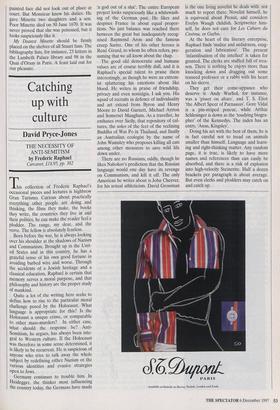Catching up with culture
David Pryce-Jones
THE NECESSITY OF ANTI-SEMITISM by Frederic Raphael Carcanet, £18.95, pp. 382 his collection of Frederic Raphael's occasional pieces and lectures is highbrow Gran Turismo. Curious about practically everything other people are doing and thinking, the films they make, the books they write, the countries they live in and their politics, he can make the reader feel a plodder. The range, my dear, and the verve. The fellow is absolutely fearless.
Born before the war, he is always looking over his shoulder at the shadows of Nazism and Communism. Brought up in the Unit- ed States and in this country, he has a grateful sense of his own good fortune in avoiding barbed wire and worse. Through the accidents of a Jewish heritage and a classical education, Raphael is certain that memory serves a moral purpose, and that philosophy and history are the proper study of mankind.
Quite a lot of the writing here seeks to define how to rise to the particular moral challenge posed by the Holocaust. What language is appropriate for this? Is the Holocaust a unique crime, or comparable to other mass-murders? In either case, what should the response be? Anti- Semitism, he argues, has always been inte- gral to Western culture. If the Holocaust was therefore in some sense determined, it is likely to be recurrent. He is suspicious of anyone who tries to talk away the whole subject by redefining either Nazism or the various identities and evasive strategies Open to Jews.
Germany continues to trouble him. In Heidegger, the thinker most influencing the country today, the Germans have made `a god out of a shit'. The entire European project looks suspiciously like a whitewash- ing of the German past. He likes and despises France in about equal propor- tions. No just balance was reached there between the great but inadequately recog- nised Raymond Aron and the famous creep Sartre. One of his other heroes is Rene Girard, to whom he often refers, pre- suming that we all know about the chap.
The good old democratic and humane values are of course terribly dull, and it is Raphael's special talent to praise them interestingly, as though he were an extrem- ist splattering his emotions about like blood. He writes in praise of friendship, privacy and even nostalgia, I ask you. His squad of recruits in defence of individuality and art extend from Byron and Henry Moore to David Garnett, Michael Ayrton and Somerset Maugham. As a traveller, he enthuses over Sicily, that repository of cul- tures, the soles of the feet of the reclining Buddha of Wat Po in Thailand, and finally an Australian ecologist by the name of John Wamsley who proposes killing all cats among other measures to save wild life down under.
There are no Russians, oddly, though he likes Nabokov's prediction that the Russian language would one day have its revenge on Communism, and kill it off. The only American he writes about is John Cheever, for his sexual athleticism. David Grossman is the one living novelist he deals with: not much to report there. Novelist himself, he is equivocal about Proust, and considers Evelyn Waugh childish. Scriptwriter him- self, he does not care for Les Cahiers du Cinema, or Garbo.
At the heart of the literary enterprise, Raphael finds 'malice and unfairness, exag- geration and fabrication'. The present `infantilisation of the intellect' is taken for granted. The clerks are stuffed full of trea- son. There is nothing he enjoys more than knocking down and dragging out some tenured professor or a rabbi with his heart on his sleeve.
They get their come-uppance who deserve it. Andy Warhol, for instance, was a `pisser on altars', and T. S. Eliot `the Albert Speer of Parnassus'. Gore Vidal is a pin-striped poseur, while Arthur Schlesinger is down as the 'toadying biogra- pher' of the Kennedys. The index has an entry, 'Anus, Kingsley'.
Doing his act with the best of them, he is in fact careful not to tread on animals smaller than himself. Language and learn- ing and right-thinking matter. Any random page, it is true, is likely to have more names and references than can easily be absorbed, and there is a risk of explosion into high-velocity Steinerite. Half a dozen brackets per paragraph is about average. But even clerks and plodders may catch on and catch up.


















































































 Previous page
Previous page